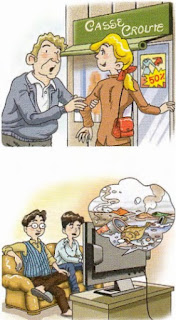 가: 여보, 옷을 또 사려고?
가: 여보, 옷을 또 사려고?
Dear, are you planning to buy any more clothes?
나: 유행에 뒤떨어지지 않으려면 옷을 자주 살 수밖에 없어요.
If I am to keep up with fashion trends, then I have no choice but to buy clothes often.
가: 환경오염 문제가 점점 더 심각해지고 있어서 큰일이에요.
Environmental pollution is getting worse, and it’s a big problem.
나: 맞아요. 환경을 보호하지 않으면 앞으로 인류는 멸망할 수밖에 없을 거예요.
Right, If we don’t protect the environment, mankind will be unable to avoid extinction,
This expression is used in situations in which there is no other choice for the subject but to do the preceding action (in the case of a verb) or to be in the preceding state (in the case of an adjective).
 가: 현금으로 내려고요?
가: 현금으로 내려고요?
Are you planning to pay with cash?
나: 이 가게에서는 신용카드가 안 된다고 하니까 현금으로 낼 수밖에 없네요.
This store apparently doesn’t take credit cards, so I have no choice but to pay with cash.
가: 여보, 오늘도 야근할 거 예요?
Dear, are you going to work late tonight, too?
나: 상사들이 모두 야근을 하니까 나도 야근을 할 수밖에 없어요.
All of my superiors work late, so I have no choice but to work late, too.
가: 지수 씨 아이가 정말 똑똑하지요?
Is Jisu’s kid really bright?
나: 부모가 다 똑똑하니까 아이도 똑똑할 수밖에 없지요.
(Her) parents are bright, so she couldn’t help being bright herself.
>> You can click on the title of each grammar below to learn about the other grammar which also expresses ‘Emphasis’:
01 얼마나 -(으)ㄴ/는지 모르다
02 -(으)ㄹ 수밖에 없다
03 -(으)ㄹ 뿐이다
04 (이)야말로
>> Full of Intermediate grammar: Click here
